PMP1 Essay: New Zealand Healthcare and Chinese Medicine
VerifiedAdded on 2022/08/21
|9
|2400
|17
Essay
AI Summary
This essay delves into the intricacies of the New Zealand healthcare system, exploring its origins and the concept of culture and social groups within the country. It examines the influence of the Maori people and Western culture on the healthcare landscape. The essay further investigates the impact and role of Traditional Chinese Medicine (TCM) in New Zealand, considering its challenges and opportunities within the modern healthcare system, including the perspectives of both Chinese immigrants and the wider population. A comparative analysis of the NZ health and social care system is presented, highlighting the structure, funding, and key sectors like maternity and aged care. The essay also traces the historical development of the maternity sector, including recent initiatives and improvements. The conclusion summarizes the key findings, emphasizing the ongoing evolution of the healthcare system and the potential benefits of integrating TCM.
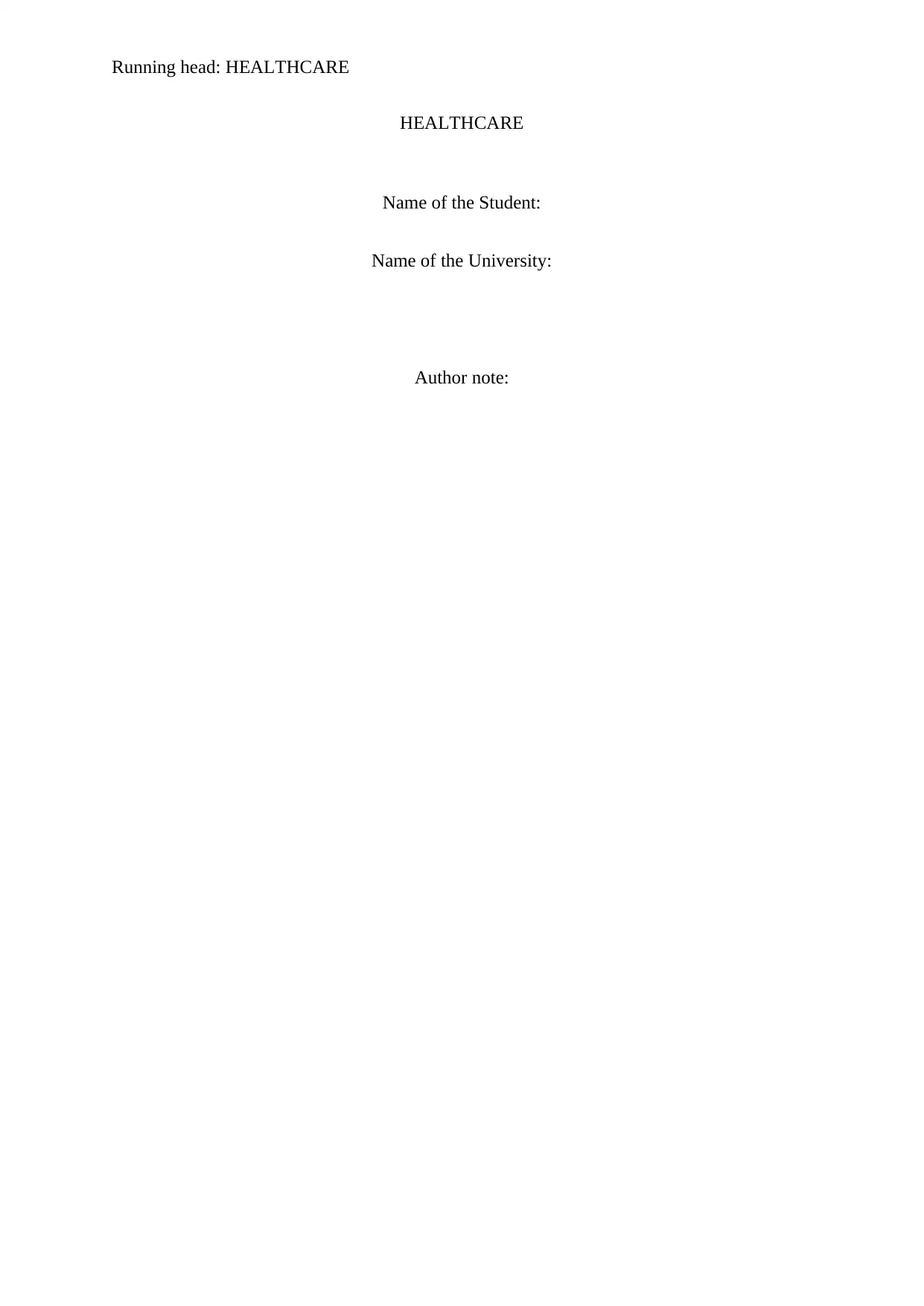
Running head: HEALTHCARE
HEALTHCARE
Name of the Student:
Name of the University:
Author note:
HEALTHCARE
Name of the Student:
Name of the University:
Author note:
Paraphrase This Document
Need a fresh take? Get an instant paraphrase of this document with our AI Paraphraser
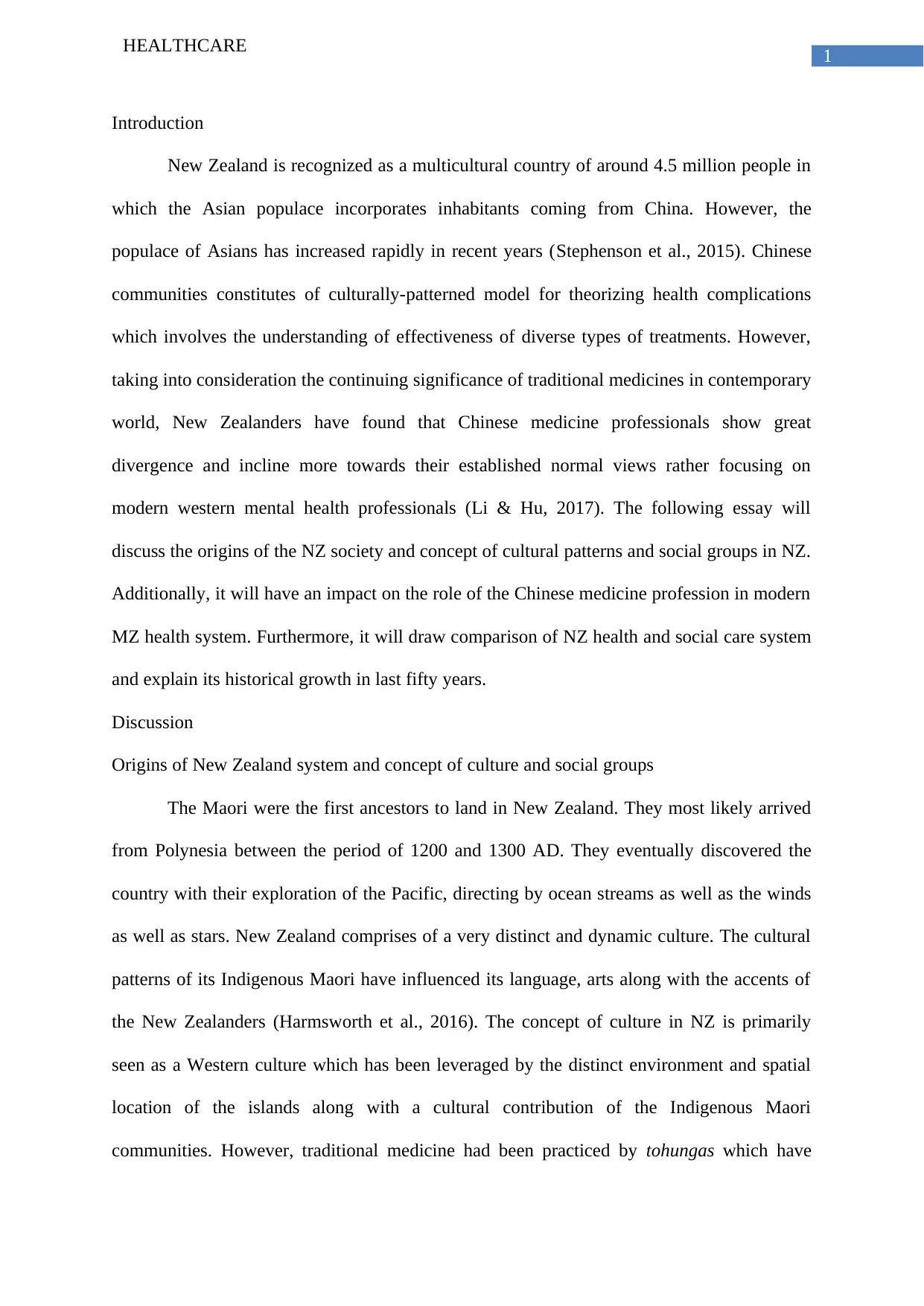
1
HEALTHCARE
Introduction
New Zealand is recognized as a multicultural country of around 4.5 million people in
which the Asian populace incorporates inhabitants coming from China. However, the
populace of Asians has increased rapidly in recent years (Stephenson et al., 2015). Chinese
communities constitutes of culturally-patterned model for theorizing health complications
which involves the understanding of effectiveness of diverse types of treatments. However,
taking into consideration the continuing significance of traditional medicines in contemporary
world, New Zealanders have found that Chinese medicine professionals show great
divergence and incline more towards their established normal views rather focusing on
modern western mental health professionals (Li & Hu, 2017). The following essay will
discuss the origins of the NZ society and concept of cultural patterns and social groups in NZ.
Additionally, it will have an impact on the role of the Chinese medicine profession in modern
MZ health system. Furthermore, it will draw comparison of NZ health and social care system
and explain its historical growth in last fifty years.
Discussion
Origins of New Zealand system and concept of culture and social groups
The Maori were the first ancestors to land in New Zealand. They most likely arrived
from Polynesia between the period of 1200 and 1300 AD. They eventually discovered the
country with their exploration of the Pacific, directing by ocean streams as well as the winds
as well as stars. New Zealand comprises of a very distinct and dynamic culture. The cultural
patterns of its Indigenous Maori have influenced its language, arts along with the accents of
the New Zealanders (Harmsworth et al., 2016). The concept of culture in NZ is primarily
seen as a Western culture which has been leveraged by the distinct environment and spatial
location of the islands along with a cultural contribution of the Indigenous Maori
communities. However, traditional medicine had been practiced by tohungas which have
HEALTHCARE
Introduction
New Zealand is recognized as a multicultural country of around 4.5 million people in
which the Asian populace incorporates inhabitants coming from China. However, the
populace of Asians has increased rapidly in recent years (Stephenson et al., 2015). Chinese
communities constitutes of culturally-patterned model for theorizing health complications
which involves the understanding of effectiveness of diverse types of treatments. However,
taking into consideration the continuing significance of traditional medicines in contemporary
world, New Zealanders have found that Chinese medicine professionals show great
divergence and incline more towards their established normal views rather focusing on
modern western mental health professionals (Li & Hu, 2017). The following essay will
discuss the origins of the NZ society and concept of cultural patterns and social groups in NZ.
Additionally, it will have an impact on the role of the Chinese medicine profession in modern
MZ health system. Furthermore, it will draw comparison of NZ health and social care system
and explain its historical growth in last fifty years.
Discussion
Origins of New Zealand system and concept of culture and social groups
The Maori were the first ancestors to land in New Zealand. They most likely arrived
from Polynesia between the period of 1200 and 1300 AD. They eventually discovered the
country with their exploration of the Pacific, directing by ocean streams as well as the winds
as well as stars. New Zealand comprises of a very distinct and dynamic culture. The cultural
patterns of its Indigenous Maori have influenced its language, arts along with the accents of
the New Zealanders (Harmsworth et al., 2016). The concept of culture in NZ is primarily
seen as a Western culture which has been leveraged by the distinct environment and spatial
location of the islands along with a cultural contribution of the Indigenous Maori
communities. However, traditional medicine had been practiced by tohungas which have
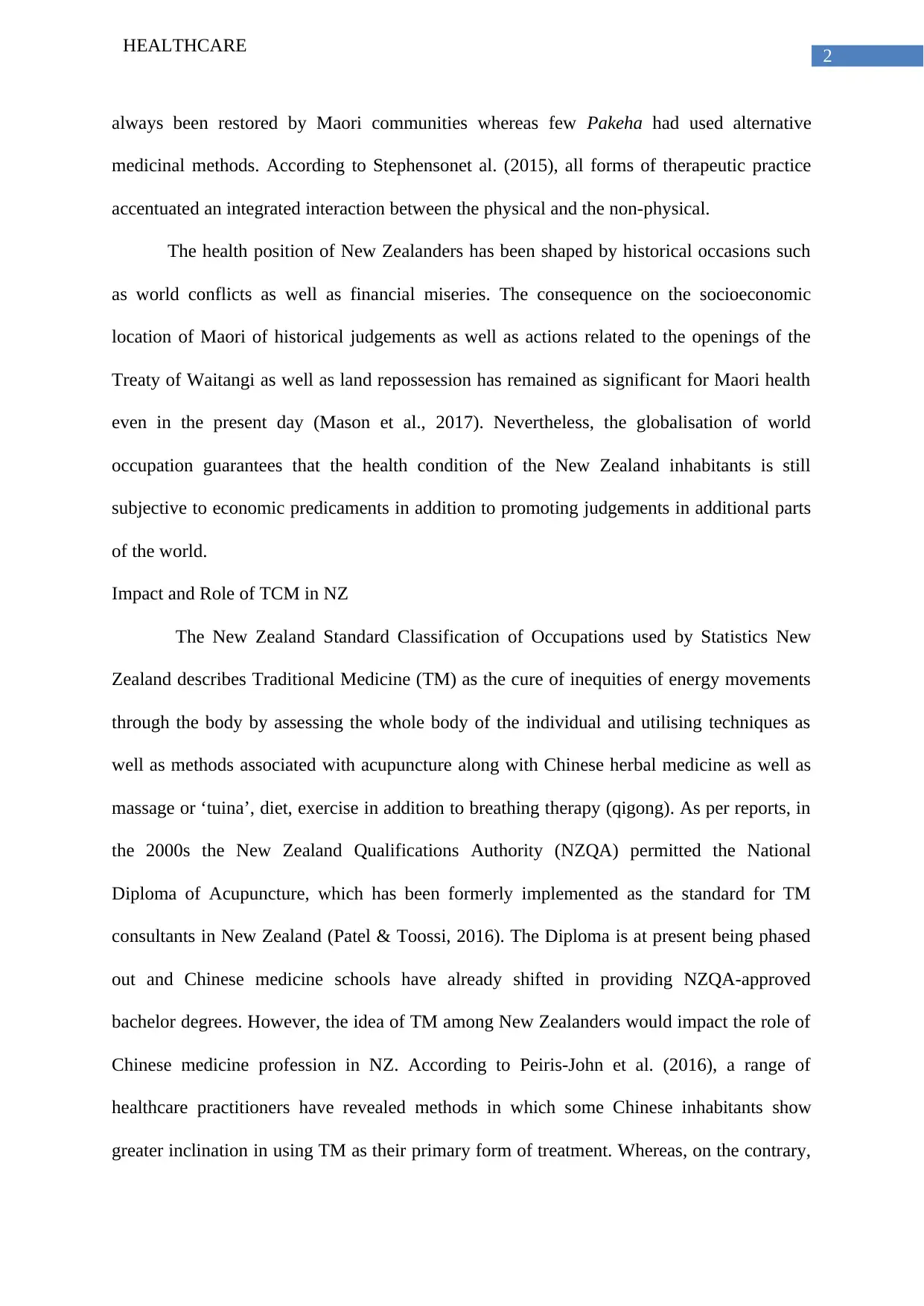
2
HEALTHCARE
always been restored by Maori communities whereas few Pakeha had used alternative
medicinal methods. According to Stephensonet al. (2015), all forms of therapeutic practice
accentuated an integrated interaction between the physical and the non-physical.
The health position of New Zealanders has been shaped by historical occasions such
as world conflicts as well as financial miseries. The consequence on the socioeconomic
location of Maori of historical judgements as well as actions related to the openings of the
Treaty of Waitangi as well as land repossession has remained as significant for Maori health
even in the present day (Mason et al., 2017). Nevertheless, the globalisation of world
occupation guarantees that the health condition of the New Zealand inhabitants is still
subjective to economic predicaments in addition to promoting judgements in additional parts
of the world.
Impact and Role of TCM in NZ
The New Zealand Standard Classification of Occupations used by Statistics New
Zealand describes Traditional Medicine (TM) as the cure of inequities of energy movements
through the body by assessing the whole body of the individual and utilising techniques as
well as methods associated with acupuncture along with Chinese herbal medicine as well as
massage or ‘tuina’, diet, exercise in addition to breathing therapy (qigong). As per reports, in
the 2000s the New Zealand Qualifications Authority (NZQA) permitted the National
Diploma of Acupuncture, which has been formerly implemented as the standard for TM
consultants in New Zealand (Patel & Toossi, 2016). The Diploma is at present being phased
out and Chinese medicine schools have already shifted in providing NZQA-approved
bachelor degrees. However, the idea of TM among New Zealanders would impact the role of
Chinese medicine profession in NZ. According to Peiris-John et al. (2016), a range of
healthcare practitioners have revealed methods in which some Chinese inhabitants show
greater inclination in using TM as their primary form of treatment. Whereas, on the contrary,
HEALTHCARE
always been restored by Maori communities whereas few Pakeha had used alternative
medicinal methods. According to Stephensonet al. (2015), all forms of therapeutic practice
accentuated an integrated interaction between the physical and the non-physical.
The health position of New Zealanders has been shaped by historical occasions such
as world conflicts as well as financial miseries. The consequence on the socioeconomic
location of Maori of historical judgements as well as actions related to the openings of the
Treaty of Waitangi as well as land repossession has remained as significant for Maori health
even in the present day (Mason et al., 2017). Nevertheless, the globalisation of world
occupation guarantees that the health condition of the New Zealand inhabitants is still
subjective to economic predicaments in addition to promoting judgements in additional parts
of the world.
Impact and Role of TCM in NZ
The New Zealand Standard Classification of Occupations used by Statistics New
Zealand describes Traditional Medicine (TM) as the cure of inequities of energy movements
through the body by assessing the whole body of the individual and utilising techniques as
well as methods associated with acupuncture along with Chinese herbal medicine as well as
massage or ‘tuina’, diet, exercise in addition to breathing therapy (qigong). As per reports, in
the 2000s the New Zealand Qualifications Authority (NZQA) permitted the National
Diploma of Acupuncture, which has been formerly implemented as the standard for TM
consultants in New Zealand (Patel & Toossi, 2016). The Diploma is at present being phased
out and Chinese medicine schools have already shifted in providing NZQA-approved
bachelor degrees. However, the idea of TM among New Zealanders would impact the role of
Chinese medicine profession in NZ. According to Peiris-John et al. (2016), a range of
healthcare practitioners have revealed methods in which some Chinese inhabitants show
greater inclination in using TM as their primary form of treatment. Whereas, on the contrary,
⊘ This is a preview!⊘
Do you want full access?
Subscribe today to unlock all pages.

Trusted by 1+ million students worldwide
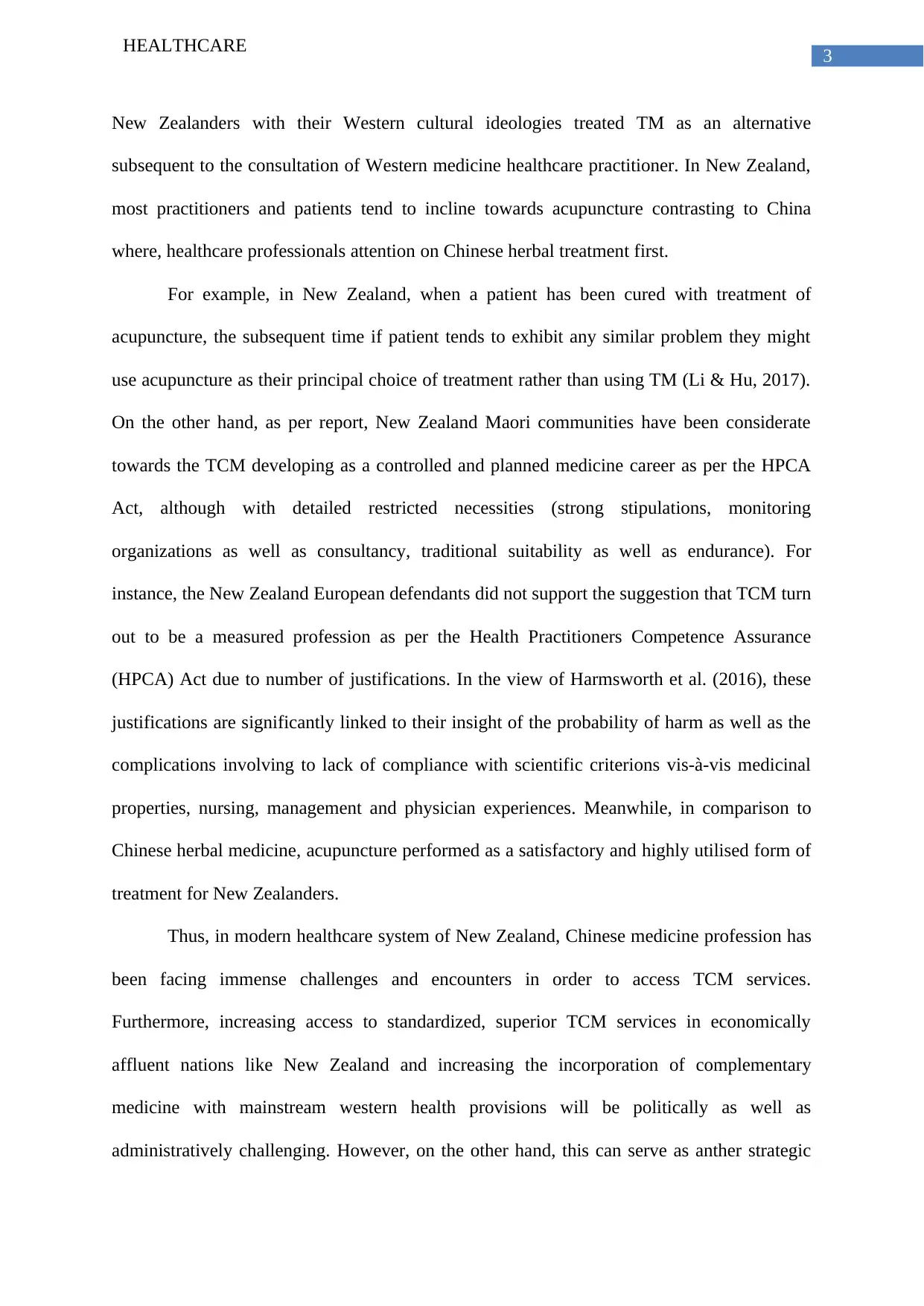
3
HEALTHCARE
New Zealanders with their Western cultural ideologies treated TM as an alternative
subsequent to the consultation of Western medicine healthcare practitioner. In New Zealand,
most practitioners and patients tend to incline towards acupuncture contrasting to China
where, healthcare professionals attention on Chinese herbal treatment first.
For example, in New Zealand, when a patient has been cured with treatment of
acupuncture, the subsequent time if patient tends to exhibit any similar problem they might
use acupuncture as their principal choice of treatment rather than using TM (Li & Hu, 2017).
On the other hand, as per report, New Zealand Maori communities have been considerate
towards the TCM developing as a controlled and planned medicine career as per the HPCA
Act, although with detailed restricted necessities (strong stipulations, monitoring
organizations as well as consultancy, traditional suitability as well as endurance). For
instance, the New Zealand European defendants did not support the suggestion that TCM turn
out to be a measured profession as per the Health Practitioners Competence Assurance
(HPCA) Act due to number of justifications. In the view of Harmsworth et al. (2016), these
justifications are significantly linked to their insight of the probability of harm as well as the
complications involving to lack of compliance with scientific criterions vis-à-vis medicinal
properties, nursing, management and physician experiences. Meanwhile, in comparison to
Chinese herbal medicine, acupuncture performed as a satisfactory and highly utilised form of
treatment for New Zealanders.
Thus, in modern healthcare system of New Zealand, Chinese medicine profession has
been facing immense challenges and encounters in order to access TCM services.
Furthermore, increasing access to standardized, superior TCM services in economically
affluent nations like New Zealand and increasing the incorporation of complementary
medicine with mainstream western health provisions will be politically as well as
administratively challenging. However, on the other hand, this can serve as anther strategic
HEALTHCARE
New Zealanders with their Western cultural ideologies treated TM as an alternative
subsequent to the consultation of Western medicine healthcare practitioner. In New Zealand,
most practitioners and patients tend to incline towards acupuncture contrasting to China
where, healthcare professionals attention on Chinese herbal treatment first.
For example, in New Zealand, when a patient has been cured with treatment of
acupuncture, the subsequent time if patient tends to exhibit any similar problem they might
use acupuncture as their principal choice of treatment rather than using TM (Li & Hu, 2017).
On the other hand, as per report, New Zealand Maori communities have been considerate
towards the TCM developing as a controlled and planned medicine career as per the HPCA
Act, although with detailed restricted necessities (strong stipulations, monitoring
organizations as well as consultancy, traditional suitability as well as endurance). For
instance, the New Zealand European defendants did not support the suggestion that TCM turn
out to be a measured profession as per the Health Practitioners Competence Assurance
(HPCA) Act due to number of justifications. In the view of Harmsworth et al. (2016), these
justifications are significantly linked to their insight of the probability of harm as well as the
complications involving to lack of compliance with scientific criterions vis-à-vis medicinal
properties, nursing, management and physician experiences. Meanwhile, in comparison to
Chinese herbal medicine, acupuncture performed as a satisfactory and highly utilised form of
treatment for New Zealanders.
Thus, in modern healthcare system of New Zealand, Chinese medicine profession has
been facing immense challenges and encounters in order to access TCM services.
Furthermore, increasing access to standardized, superior TCM services in economically
affluent nations like New Zealand and increasing the incorporation of complementary
medicine with mainstream western health provisions will be politically as well as
administratively challenging. However, on the other hand, this can serve as anther strategic
Paraphrase This Document
Need a fresh take? Get an instant paraphrase of this document with our AI Paraphraser
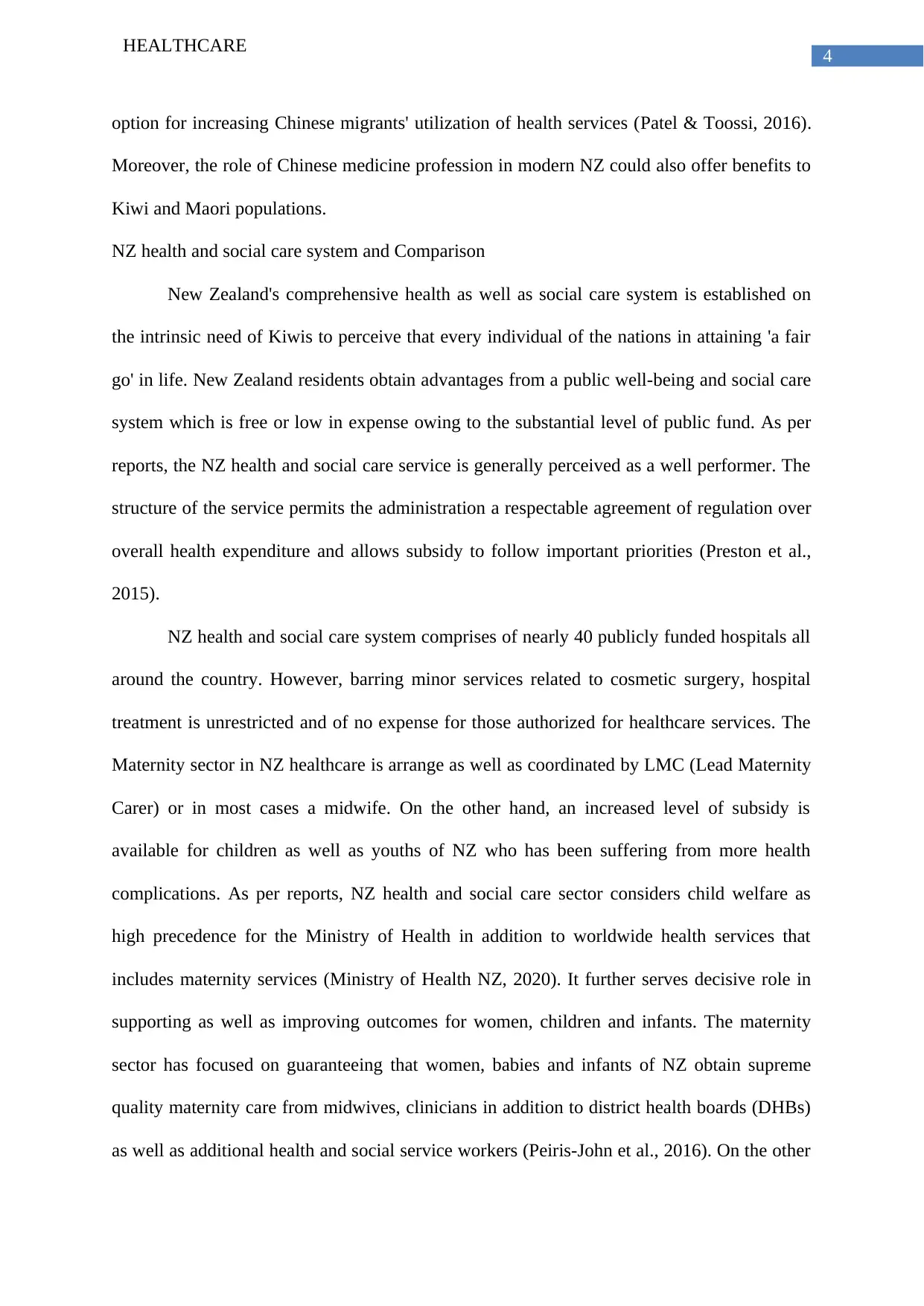
4
HEALTHCARE
option for increasing Chinese migrants' utilization of health services (Patel & Toossi, 2016).
Moreover, the role of Chinese medicine profession in modern NZ could also offer benefits to
Kiwi and Maori populations.
NZ health and social care system and Comparison
New Zealand's comprehensive health as well as social care system is established on
the intrinsic need of Kiwis to perceive that every individual of the nations in attaining 'a fair
go' in life. New Zealand residents obtain advantages from a public well-being and social care
system which is free or low in expense owing to the substantial level of public fund. As per
reports, the NZ health and social care service is generally perceived as a well performer. The
structure of the service permits the administration a respectable agreement of regulation over
overall health expenditure and allows subsidy to follow important priorities (Preston et al.,
2015).
NZ health and social care system comprises of nearly 40 publicly funded hospitals all
around the country. However, barring minor services related to cosmetic surgery, hospital
treatment is unrestricted and of no expense for those authorized for healthcare services. The
Maternity sector in NZ healthcare is arrange as well as coordinated by LMC (Lead Maternity
Carer) or in most cases a midwife. On the other hand, an increased level of subsidy is
available for children as well as youths of NZ who has been suffering from more health
complications. As per reports, NZ health and social care sector considers child welfare as
high precedence for the Ministry of Health in addition to worldwide health services that
includes maternity services (Ministry of Health NZ, 2020). It further serves decisive role in
supporting as well as improving outcomes for women, children and infants. The maternity
sector has focused on guaranteeing that women, babies and infants of NZ obtain supreme
quality maternity care from midwives, clinicians in addition to district health boards (DHBs)
as well as additional health and social service workers (Peiris-John et al., 2016). On the other
HEALTHCARE
option for increasing Chinese migrants' utilization of health services (Patel & Toossi, 2016).
Moreover, the role of Chinese medicine profession in modern NZ could also offer benefits to
Kiwi and Maori populations.
NZ health and social care system and Comparison
New Zealand's comprehensive health as well as social care system is established on
the intrinsic need of Kiwis to perceive that every individual of the nations in attaining 'a fair
go' in life. New Zealand residents obtain advantages from a public well-being and social care
system which is free or low in expense owing to the substantial level of public fund. As per
reports, the NZ health and social care service is generally perceived as a well performer. The
structure of the service permits the administration a respectable agreement of regulation over
overall health expenditure and allows subsidy to follow important priorities (Preston et al.,
2015).
NZ health and social care system comprises of nearly 40 publicly funded hospitals all
around the country. However, barring minor services related to cosmetic surgery, hospital
treatment is unrestricted and of no expense for those authorized for healthcare services. The
Maternity sector in NZ healthcare is arrange as well as coordinated by LMC (Lead Maternity
Carer) or in most cases a midwife. On the other hand, an increased level of subsidy is
available for children as well as youths of NZ who has been suffering from more health
complications. As per reports, NZ health and social care sector considers child welfare as
high precedence for the Ministry of Health in addition to worldwide health services that
includes maternity services (Ministry of Health NZ, 2020). It further serves decisive role in
supporting as well as improving outcomes for women, children and infants. The maternity
sector has focused on guaranteeing that women, babies and infants of NZ obtain supreme
quality maternity care from midwives, clinicians in addition to district health boards (DHBs)
as well as additional health and social service workers (Peiris-John et al., 2016). On the other
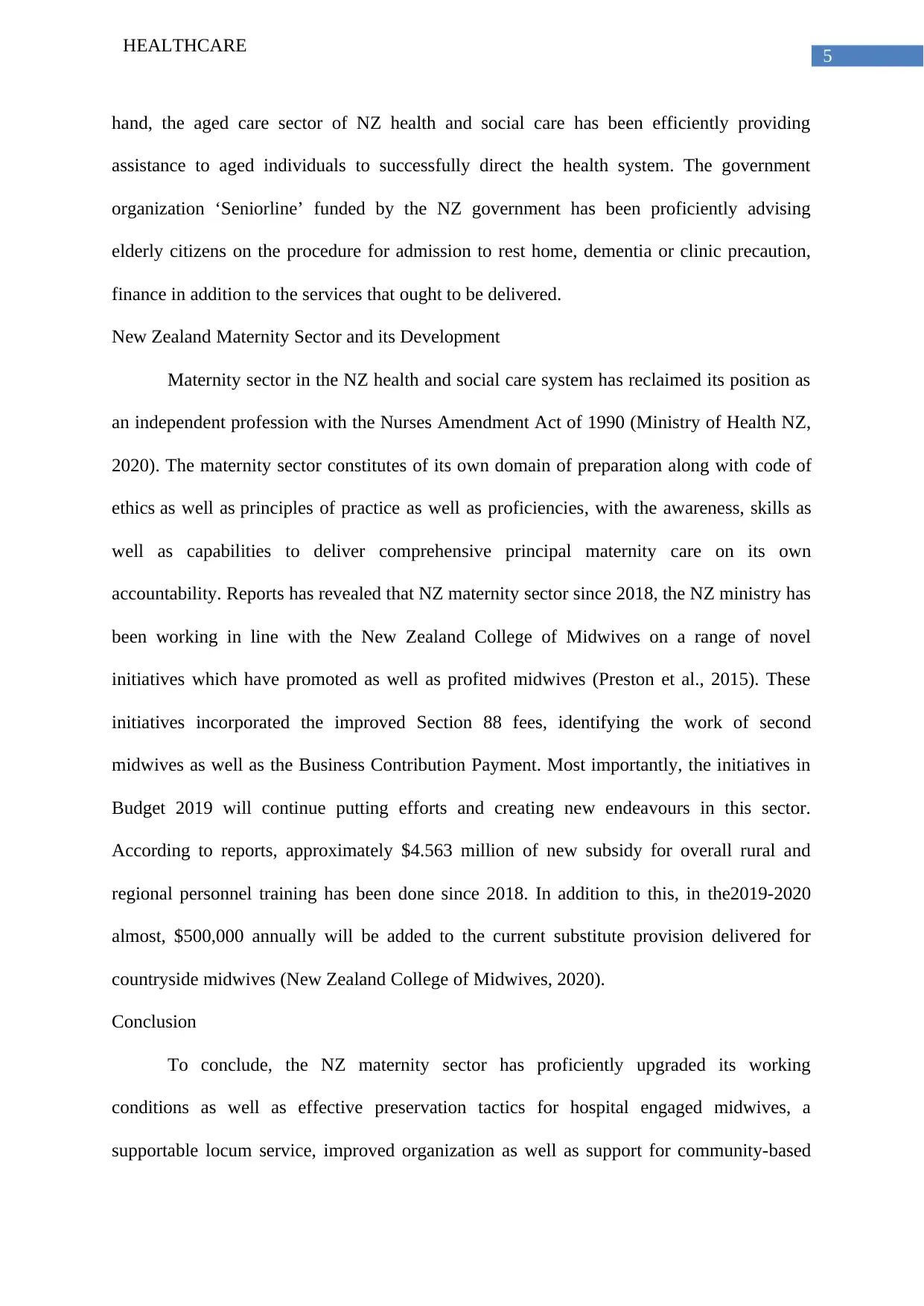
5
HEALTHCARE
hand, the aged care sector of NZ health and social care has been efficiently providing
assistance to aged individuals to successfully direct the health system. The government
organization ‘Seniorline’ funded by the NZ government has been proficiently advising
elderly citizens on the procedure for admission to rest home, dementia or clinic precaution,
finance in addition to the services that ought to be delivered.
New Zealand Maternity Sector and its Development
Maternity sector in the NZ health and social care system has reclaimed its position as
an independent profession with the Nurses Amendment Act of 1990 (Ministry of Health NZ,
2020). The maternity sector constitutes of its own domain of preparation along with code of
ethics as well as principles of practice as well as proficiencies, with the awareness, skills as
well as capabilities to deliver comprehensive principal maternity care on its own
accountability. Reports has revealed that NZ maternity sector since 2018, the NZ ministry has
been working in line with the New Zealand College of Midwives on a range of novel
initiatives which have promoted as well as profited midwives (Preston et al., 2015). These
initiatives incorporated the improved Section 88 fees, identifying the work of second
midwives as well as the Business Contribution Payment. Most importantly, the initiatives in
Budget 2019 will continue putting efforts and creating new endeavours in this sector.
According to reports, approximately $4.563 million of new subsidy for overall rural and
regional personnel training has been done since 2018. In addition to this, in the2019-2020
almost, $500,000 annually will be added to the current substitute provision delivered for
countryside midwives (New Zealand College of Midwives, 2020).
Conclusion
To conclude, the NZ maternity sector has proficiently upgraded its working
conditions as well as effective preservation tactics for hospital engaged midwives, a
supportable locum service, improved organization as well as support for community-based
HEALTHCARE
hand, the aged care sector of NZ health and social care has been efficiently providing
assistance to aged individuals to successfully direct the health system. The government
organization ‘Seniorline’ funded by the NZ government has been proficiently advising
elderly citizens on the procedure for admission to rest home, dementia or clinic precaution,
finance in addition to the services that ought to be delivered.
New Zealand Maternity Sector and its Development
Maternity sector in the NZ health and social care system has reclaimed its position as
an independent profession with the Nurses Amendment Act of 1990 (Ministry of Health NZ,
2020). The maternity sector constitutes of its own domain of preparation along with code of
ethics as well as principles of practice as well as proficiencies, with the awareness, skills as
well as capabilities to deliver comprehensive principal maternity care on its own
accountability. Reports has revealed that NZ maternity sector since 2018, the NZ ministry has
been working in line with the New Zealand College of Midwives on a range of novel
initiatives which have promoted as well as profited midwives (Preston et al., 2015). These
initiatives incorporated the improved Section 88 fees, identifying the work of second
midwives as well as the Business Contribution Payment. Most importantly, the initiatives in
Budget 2019 will continue putting efforts and creating new endeavours in this sector.
According to reports, approximately $4.563 million of new subsidy for overall rural and
regional personnel training has been done since 2018. In addition to this, in the2019-2020
almost, $500,000 annually will be added to the current substitute provision delivered for
countryside midwives (New Zealand College of Midwives, 2020).
Conclusion
To conclude, the NZ maternity sector has proficiently upgraded its working
conditions as well as effective preservation tactics for hospital engaged midwives, a
supportable locum service, improved organization as well as support for community-based
⊘ This is a preview!⊘
Do you want full access?
Subscribe today to unlock all pages.

Trusted by 1+ million students worldwide
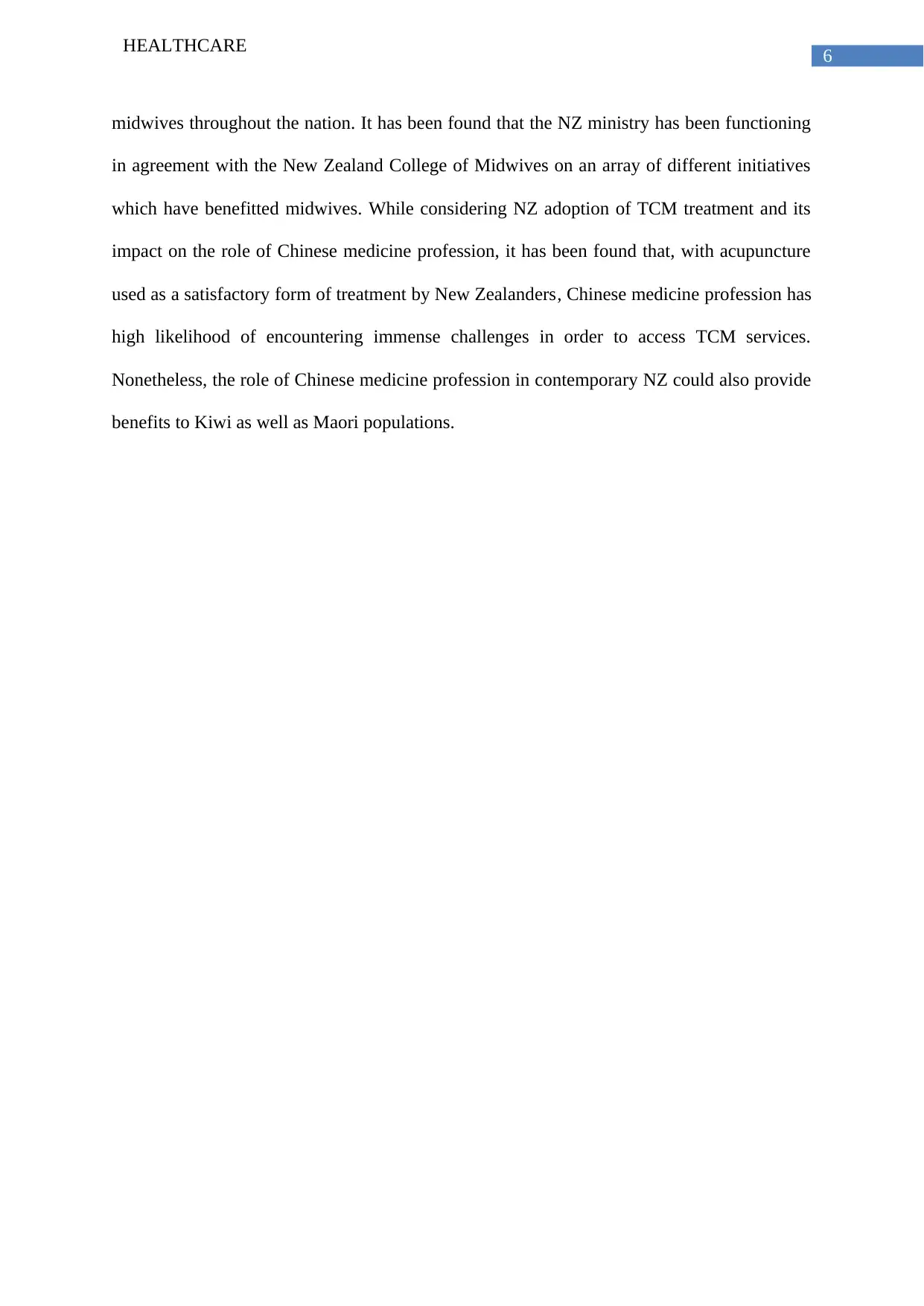
6
HEALTHCARE
midwives throughout the nation. It has been found that the NZ ministry has been functioning
in agreement with the New Zealand College of Midwives on an array of different initiatives
which have benefitted midwives. While considering NZ adoption of TCM treatment and its
impact on the role of Chinese medicine profession, it has been found that, with acupuncture
used as a satisfactory form of treatment by New Zealanders, Chinese medicine profession has
high likelihood of encountering immense challenges in order to access TCM services.
Nonetheless, the role of Chinese medicine profession in contemporary NZ could also provide
benefits to Kiwi as well as Maori populations.
HEALTHCARE
midwives throughout the nation. It has been found that the NZ ministry has been functioning
in agreement with the New Zealand College of Midwives on an array of different initiatives
which have benefitted midwives. While considering NZ adoption of TCM treatment and its
impact on the role of Chinese medicine profession, it has been found that, with acupuncture
used as a satisfactory form of treatment by New Zealanders, Chinese medicine profession has
high likelihood of encountering immense challenges in order to access TCM services.
Nonetheless, the role of Chinese medicine profession in contemporary NZ could also provide
benefits to Kiwi as well as Maori populations.
Paraphrase This Document
Need a fresh take? Get an instant paraphrase of this document with our AI Paraphraser
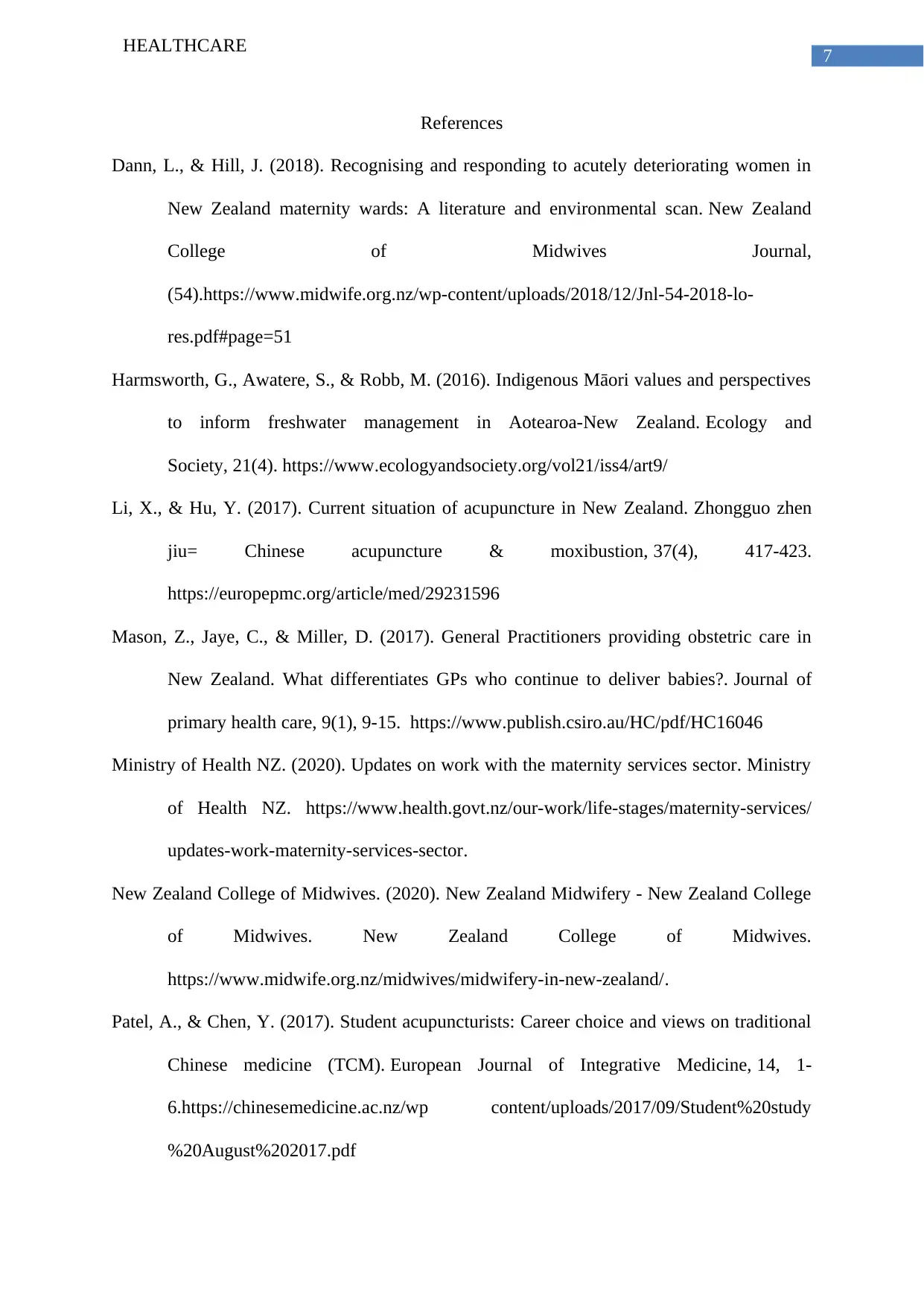
7
HEALTHCARE
References
Dann, L., & Hill, J. (2018). Recognising and responding to acutely deteriorating women in
New Zealand maternity wards: A literature and environmental scan. New Zealand
College of Midwives Journal,
(54).https://www.midwife.org.nz/wp-content/uploads/2018/12/Jnl-54-2018-lo-
res.pdf#page=51
Harmsworth, G., Awatere, S., & Robb, M. (2016). Indigenous Māori values and perspectives
to inform freshwater management in Aotearoa-New Zealand. Ecology and
Society, 21(4). https://www.ecologyandsociety.org/vol21/iss4/art9/
Li, X., & Hu, Y. (2017). Current situation of acupuncture in New Zealand. Zhongguo zhen
jiu= Chinese acupuncture & moxibustion, 37(4), 417-423.
https://europepmc.org/article/med/29231596
Mason, Z., Jaye, C., & Miller, D. (2017). General Practitioners providing obstetric care in
New Zealand. What differentiates GPs who continue to deliver babies?. Journal of
primary health care, 9(1), 9-15. https://www.publish.csiro.au/HC/pdf/HC16046
Ministry of Health NZ. (2020). Updates on work with the maternity services sector. Ministry
of Health NZ. https://www.health.govt.nz/our-work/life-stages/maternity-services/
updates-work-maternity-services-sector.
New Zealand College of Midwives. (2020). New Zealand Midwifery - New Zealand College
of Midwives. New Zealand College of Midwives.
https://www.midwife.org.nz/midwives/midwifery-in-new-zealand/.
Patel, A., & Chen, Y. (2017). Student acupuncturists: Career choice and views on traditional
Chinese medicine (TCM). European Journal of Integrative Medicine, 14, 1-
6.https://chinesemedicine.ac.nz/wp content/uploads/2017/09/Student%20study
%20August%202017.pdf
HEALTHCARE
References
Dann, L., & Hill, J. (2018). Recognising and responding to acutely deteriorating women in
New Zealand maternity wards: A literature and environmental scan. New Zealand
College of Midwives Journal,
(54).https://www.midwife.org.nz/wp-content/uploads/2018/12/Jnl-54-2018-lo-
res.pdf#page=51
Harmsworth, G., Awatere, S., & Robb, M. (2016). Indigenous Māori values and perspectives
to inform freshwater management in Aotearoa-New Zealand. Ecology and
Society, 21(4). https://www.ecologyandsociety.org/vol21/iss4/art9/
Li, X., & Hu, Y. (2017). Current situation of acupuncture in New Zealand. Zhongguo zhen
jiu= Chinese acupuncture & moxibustion, 37(4), 417-423.
https://europepmc.org/article/med/29231596
Mason, Z., Jaye, C., & Miller, D. (2017). General Practitioners providing obstetric care in
New Zealand. What differentiates GPs who continue to deliver babies?. Journal of
primary health care, 9(1), 9-15. https://www.publish.csiro.au/HC/pdf/HC16046
Ministry of Health NZ. (2020). Updates on work with the maternity services sector. Ministry
of Health NZ. https://www.health.govt.nz/our-work/life-stages/maternity-services/
updates-work-maternity-services-sector.
New Zealand College of Midwives. (2020). New Zealand Midwifery - New Zealand College
of Midwives. New Zealand College of Midwives.
https://www.midwife.org.nz/midwives/midwifery-in-new-zealand/.
Patel, A., & Chen, Y. (2017). Student acupuncturists: Career choice and views on traditional
Chinese medicine (TCM). European Journal of Integrative Medicine, 14, 1-
6.https://chinesemedicine.ac.nz/wp content/uploads/2017/09/Student%20study
%20August%202017.pdf
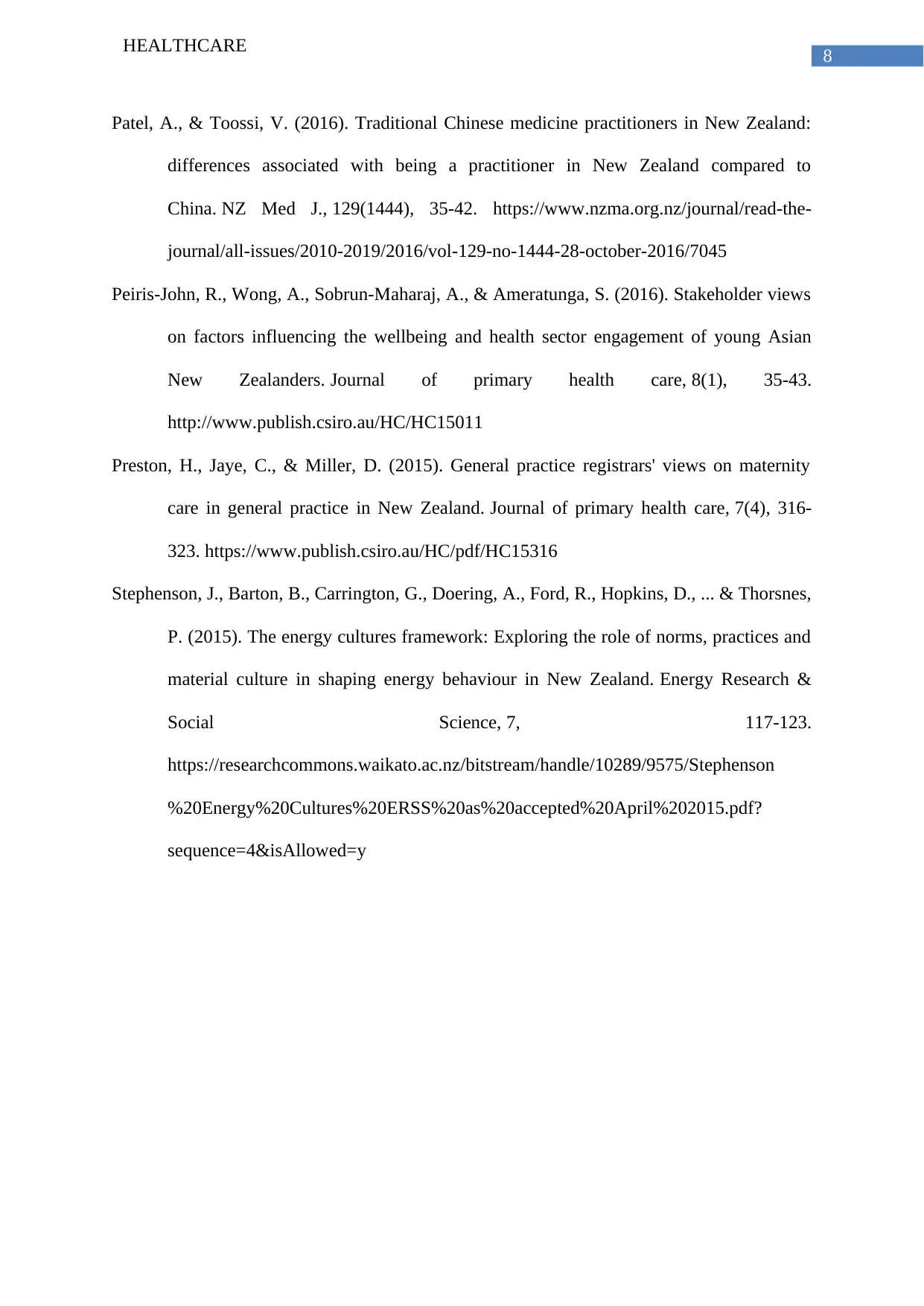
8
HEALTHCARE
Patel, A., & Toossi, V. (2016). Traditional Chinese medicine practitioners in New Zealand:
differences associated with being a practitioner in New Zealand compared to
China. NZ Med J., 129(1444), 35-42. https://www.nzma.org.nz/journal/read-the-
journal/all-issues/2010-2019/2016/vol-129-no-1444-28-october-2016/7045
Peiris-John, R., Wong, A., Sobrun-Maharaj, A., & Ameratunga, S. (2016). Stakeholder views
on factors influencing the wellbeing and health sector engagement of young Asian
New Zealanders. Journal of primary health care, 8(1), 35-43.
http://www.publish.csiro.au/HC/HC15011
Preston, H., Jaye, C., & Miller, D. (2015). General practice registrars' views on maternity
care in general practice in New Zealand. Journal of primary health care, 7(4), 316-
323. https://www.publish.csiro.au/HC/pdf/HC15316
Stephenson, J., Barton, B., Carrington, G., Doering, A., Ford, R., Hopkins, D., ... & Thorsnes,
P. (2015). The energy cultures framework: Exploring the role of norms, practices and
material culture in shaping energy behaviour in New Zealand. Energy Research &
Social Science, 7, 117-123.
https://researchcommons.waikato.ac.nz/bitstream/handle/10289/9575/Stephenson
%20Energy%20Cultures%20ERSS%20as%20accepted%20April%202015.pdf?
sequence=4&isAllowed=y
HEALTHCARE
Patel, A., & Toossi, V. (2016). Traditional Chinese medicine practitioners in New Zealand:
differences associated with being a practitioner in New Zealand compared to
China. NZ Med J., 129(1444), 35-42. https://www.nzma.org.nz/journal/read-the-
journal/all-issues/2010-2019/2016/vol-129-no-1444-28-october-2016/7045
Peiris-John, R., Wong, A., Sobrun-Maharaj, A., & Ameratunga, S. (2016). Stakeholder views
on factors influencing the wellbeing and health sector engagement of young Asian
New Zealanders. Journal of primary health care, 8(1), 35-43.
http://www.publish.csiro.au/HC/HC15011
Preston, H., Jaye, C., & Miller, D. (2015). General practice registrars' views on maternity
care in general practice in New Zealand. Journal of primary health care, 7(4), 316-
323. https://www.publish.csiro.au/HC/pdf/HC15316
Stephenson, J., Barton, B., Carrington, G., Doering, A., Ford, R., Hopkins, D., ... & Thorsnes,
P. (2015). The energy cultures framework: Exploring the role of norms, practices and
material culture in shaping energy behaviour in New Zealand. Energy Research &
Social Science, 7, 117-123.
https://researchcommons.waikato.ac.nz/bitstream/handle/10289/9575/Stephenson
%20Energy%20Cultures%20ERSS%20as%20accepted%20April%202015.pdf?
sequence=4&isAllowed=y
⊘ This is a preview!⊘
Do you want full access?
Subscribe today to unlock all pages.

Trusted by 1+ million students worldwide
1 out of 9
Related Documents
Your All-in-One AI-Powered Toolkit for Academic Success.
+13062052269
info@desklib.com
Available 24*7 on WhatsApp / Email
![[object Object]](/_next/static/media/star-bottom.7253800d.svg)
Unlock your academic potential
Copyright © 2020–2026 A2Z Services. All Rights Reserved. Developed and managed by ZUCOL.



